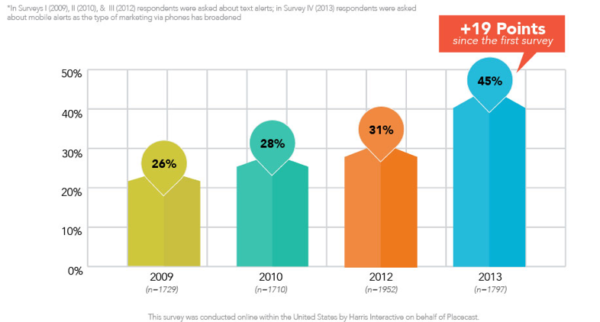Survey: Interest In Place-Based Mobile Offers Growing
Mobile loyalty platform Placecast has sponsored research (conducted by Harris Interactive) since 2009 about consumer attitudes toward mobile marketing and specifically receptiveness to location-based mobile marketing. The research is called the “Alert Shopper” and it’s now in its fourth year and fourth wave. The particular survey out today was done in May and had 2,000 […]
Mobile loyalty platform Placecast has sponsored research (conducted by Harris Interactive) since 2009 about consumer attitudes toward mobile marketing and specifically receptiveness to location-based mobile marketing. The research is called the “Alert Shopper” and it’s now in its fourth year and fourth wave.
The particular survey out today was done in May and had 2,000 US adult respondents.
Participants (a mix of conventional handset and smartphone owners) were asked about their interest in receiving “mobile alerts” from brands and marketers (after an opt-in). The data in the chart immediately below reflect 19 percent growth in consumer interest over time.
![]()

Source: Placecast-Harris Interactive (5/13)
I suspect the idea of permission as a prerequisite to receiving these alerts made respondents more receptive. Regardless this is positive news for mobile marketers.
Large majorities of respondents (smartphone owners in particular) also indicated strong interest in accessing local information on their phones, which extends to offers and commercial messages.
Almost 90 percent of respondents said that accessing local information on their phones was at least somewhat important, while nearly 40 percent said it was very important and they were “extremely interested” in location-based content (including offers).

Source: Placecast-Harris Interactive (5/13)
While SMS was once at the center of the mobile marketing discussion, the rise of smartphones and apps have made text-based marketing less interesting to many brands and agencies. It’s also harder to do well because of opt-in and anti-spam rules. The flip side, however, is the creation of a more receptive consumer relationship, where action is more likely.
Indeed, these survey data argue that permission-based SMS mobile marketing could be an extremely effective complementary mobile channel and should be included as part of a holistic mobile strategy.
Permission-based SMS mobile alerts are very much the mobile equivalent of email.
Contributing authors are invited to create content for MarTech and are chosen for their expertise and contribution to the search community. Our contributors work under the oversight of the editorial staff and contributions are checked for quality and relevance to our readers. MarTech is owned by Semrush. Contributor was not asked to make any direct or indirect mentions of Semrush. The opinions they express are their own.
Related stories